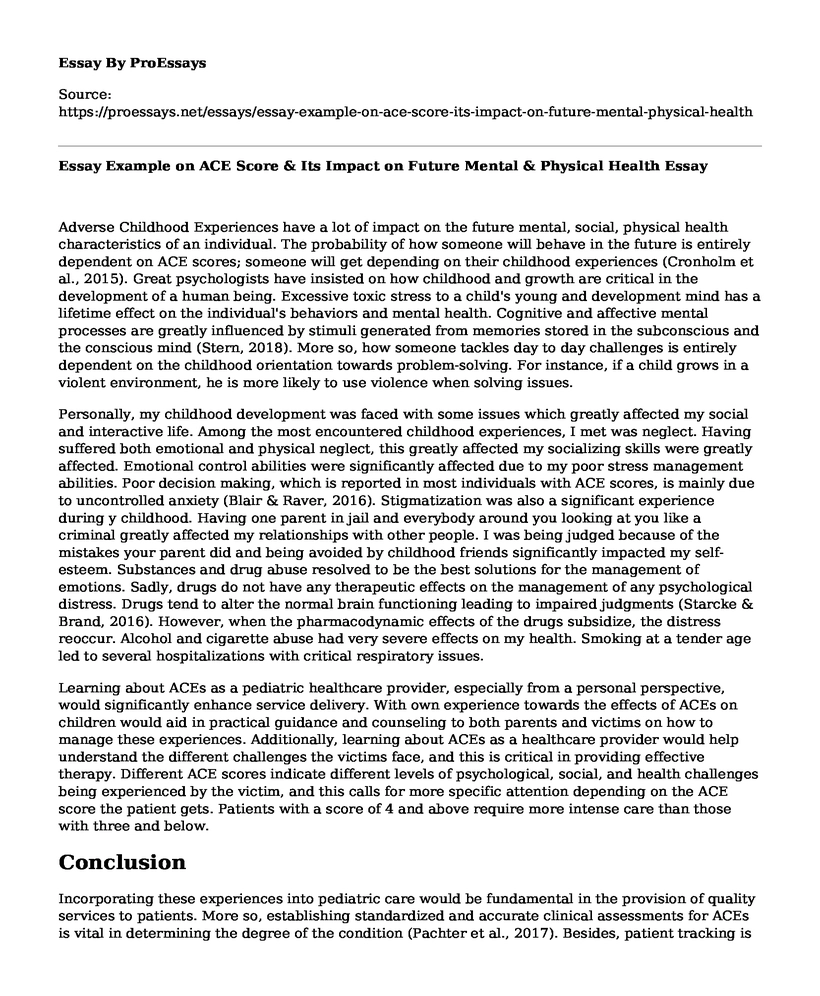Adverse Childhood Experiences have a lot of impact on the future mental, social, physical health characteristics of an individual. The probability of how someone will behave in the future is entirely dependent on ACE scores; someone will get depending on their childhood experiences (Cronholm et al., 2015). Great psychologists have insisted on how childhood and growth are critical in the development of a human being. Excessive toxic stress to a child's young and development mind has a lifetime effect on the individual's behaviors and mental health. Cognitive and affective mental processes are greatly influenced by stimuli generated from memories stored in the subconscious and the conscious mind (Stern, 2018). More so, how someone tackles day to day challenges is entirely dependent on the childhood orientation towards problem-solving. For instance, if a child grows in a violent environment, he is more likely to use violence when solving issues.
Personally, my childhood development was faced with some issues which greatly affected my social and interactive life. Among the most encountered childhood experiences, I met was neglect. Having suffered both emotional and physical neglect, this greatly affected my socializing skills were greatly affected. Emotional control abilities were significantly affected due to my poor stress management abilities. Poor decision making, which is reported in most individuals with ACE scores, is mainly due to uncontrolled anxiety (Blair & Raver, 2016). Stigmatization was also a significant experience during y childhood. Having one parent in jail and everybody around you looking at you like a criminal greatly affected my relationships with other people. I was being judged because of the mistakes your parent did and being avoided by childhood friends significantly impacted my self-esteem. Substances and drug abuse resolved to be the best solutions for the management of emotions. Sadly, drugs do not have any therapeutic effects on the management of any psychological distress. Drugs tend to alter the normal brain functioning leading to impaired judgments (Starcke & Brand, 2016). However, when the pharmacodynamic effects of the drugs subsidize, the distress reoccur. Alcohol and cigarette abuse had very severe effects on my health. Smoking at a tender age led to several hospitalizations with critical respiratory issues.
Learning about ACEs as a pediatric healthcare provider, especially from a personal perspective, would significantly enhance service delivery. With own experience towards the effects of ACEs on children would aid in practical guidance and counseling to both parents and victims on how to manage these experiences. Additionally, learning about ACEs as a healthcare provider would help understand the different challenges the victims face, and this is critical in providing effective therapy. Different ACE scores indicate different levels of psychological, social, and health challenges being experienced by the victim, and this calls for more specific attention depending on the ACE score the patient gets. Patients with a score of 4 and above require more intense care than those with three and below.
Conclusion
Incorporating these experiences into pediatric care would be fundamental in the provision of quality services to patients. More so, establishing standardized and accurate clinical assessments for ACEs is vital in determining the degree of the condition (Pachter et al., 2017). Besides, patient tracking is essential as it enlightens about the source of the problem in the patient. Since parents who might be sources of the ACEs are the ones bring the children to healthcare facilities, it is crucial to identify possible barriers that might hinder effective therapy as children might fear giving out critical information. It is imperative in the prevention of downstream effects as the situation is controlled from the source.
References
Blair, C., & Raver, C. C. (2016). Poverty, stress, and brain development: New directions for prevention and intervention. Academic pediatrics, 16(3), S30-S36.
Cronholm, P. F., Forke, C. M., Wade, R., Bair-Merritt, M. H., Davis, M., Harkins-Schwarz, M., ... & Fein, J. A. (2015). Adverse childhood experiences: Expanding the concept of adversity. American journal of preventive medicine, 49(3), 354-361.
Pachter, L. M., Lieberman, L., Bloom, S. L., & Fein, J. A. (2017). Developing a community-wide initiative to address childhood adversity and toxic stress: a case study of the Philadelphia ACE task force. Academic pediatrics, 17(7), S130-S135.
Starcke, K., & Brand, M. (2016). Effects of stress on decisions under uncertainty: A meta-analysis. Psychological bulletin, 142(9), 909.
Stern, D. N. (2018). The interpersonal world of the infant: A view from psychoanalysis and developmental psychology. Routledge.
Cite this page
Essay Example on ACE Score & Its Impact on Future Mental & Physical Health. (2023, Aug 08). Retrieved from https://proessays.net/essays/essay-example-on-ace-score-its-impact-on-future-mental-physical-health
If you are the original author of this essay and no longer wish to have it published on the ProEssays website, please click below to request its removal:
- Time-space Constraints and Depression in Education
- Classroom Management Proposal
- Celtic Impact on English Language: London and Beyond! - Essay Sample
- Psychedelics for Mental Illness: Exploring Possibilities - Essay Sample
- Essay Example on From High School to Foreign Service: My Career Path
- Essay Example on My Mother, Mariam: A Life of Service and Dedication
- Essay Example on Mexican American: My Cultural Identity Journey in Shaping My Personality







